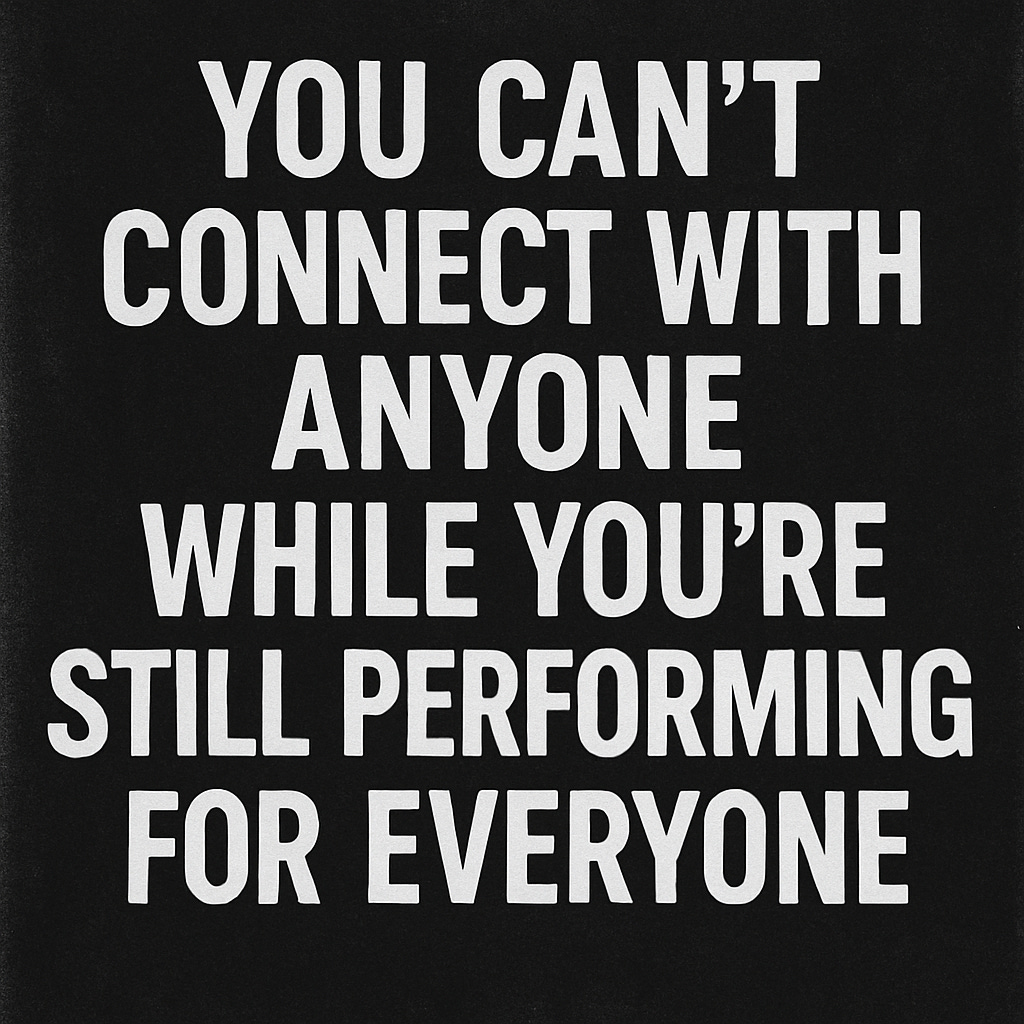You can’t connect with anyone while you’re still performing for everyone
Most of us learned to be likeable before we learned to be human.
What if the reason you feel alone in a room full of people… is because none of them have actually met you?
Not the bit that still flinches when someone says “we should talk.” Not the part you keep buried under humour, usefulness, and never being the one who needs anything.
They’ve met your draft copy. The polished cut-out with just enough warmth to pass for human. The version that smiles at the right time and says the right thing and quietly hopes no one asks how you really are.
I spent most of my life being good at people. Not brilliant. Just scarily accurate. Like a lie detector with personality issues.
It wasn’t a skill. It was a scar. A reaction. Something born in silence. When you grow up knowing connection is conditional, you don’t develop a personality. You build a character sheet.
I could walk into a room and feel it before anyone spoke. Who was pretending. Who was cracking. Who was just seconds from disappearing into themselves.
I didn’t talk to people. I studied them. I absorbed every twitch, every glance, every fake laugh, like smoke in a jacket.
I learned how to become whatever made other people comfortable.
When to talk. When to shut up. When to mirror their breathing, or their rage, or their fear. I could feel someone’s shame before they admitted it existed.
They said I was emotionally intelligent. And I was. But no one tells you what that actually means.
It means you’ve spent so long managing other people’s emotions, you’ve forgotten how to feel your own.
It means you say the right thing while silently screaming. It means people think you’re grounded when you’re barely staying in the room.
Some called it charm. A few said manipulative. Others said gifted.
It wasn’t a gift. It was a shield. A well-practiced trauma response in the shape of a likable human.
And the truth is? I was tired. Of people. Of pretending. Of translating every interaction into something palatable so no one ever had to sit with the real version of me.
People weren’t bad. They were just... heavy. So desperate to be seen but terrified of being known. Wanting connection with none of the mess. Wanting safety without honesty. Wanting affection without intimacy.
And I gave it to them. Again and again. Until I couldn’t tell if they were addicted to my mask, or I was.
That’s the thing no one warns you about.
Social engineering works. You can make people love you. You can create trust, create closeness, create chemistry.
But it’s all conditional. Because they’re loving a version of you that you invented just to survive the first ten seconds.
And eventually, you start resenting them. Not because they’re shallow. But because they believe the performance you crafted for their comfort.
They think they know you. Of course they do. That was the point.
That’s not poetic. It’s fucking tragic.
Every conversation was theatre. Every laugh was rehearsed. Connection by compensation. Eye contact as camouflage. Smiles as small talk. Nods instead of boundaries.
When you’ve been performing for years, real connection feels like malfunction. Like you’re glitching in front of someone. Showing too much. Saying too little. Bleeding out in slow motion.
Stopping the performance doesn’t feel empowering. It feels like vomiting in front of someone and daring them to stay.
And so you kill it.
The voice that shifts to match theirs. Gone. The jokes that deflect the pain. Muted. The part of you that changes shape just to keep the peace. Dead.
And then you wait. Bare. Still. Hoping someone sees you.
I didn’t just disappear emotionally. I disappeared for real.
Not off-grid, not underground, not wrapped in conspiracy. I disappeared by being exactly what everyone needed—until there was nothing left of me worth noticing.
Most people think disappearing is dramatic. That it’s firewalls and burner phones. A clean slate and a mysterious exit. That’s TV. Real disappearance is slower. Colder. It doesn’t look like someone leaving. It looks like someone never really being there.
You don’t hide. You blend. You become the kind of person no one rewinds to look for. Quiet. Predictable. Lightly forgettable.
I built that version like armour. Smile soft. Language plain. Backstory functional. No details sharp enough to catch on. A job that made sense but inspired zero follow-up questions. Accountant. Office assistant. Remote admin for a medical supplier in Zagreb. I once said I worked in toner logistics. No one ever asked a second thing.
That’s how you disappear. Not with absence. With familiarity.
People don’t chase what doesn’t move. They chase what stands out. So I stopped standing. I sat inside their comfort zones and became part of the furniture.
Social engineering let me do that. It gave me the map to someone’s worldview, and the tools to match it without friction. Speak at their pace. Match their tone. Reflect their values. Lower the temperature. Regulate their sense of threat.
You want people to feel safe? Agree with them in the right register. You want them to remember you? Make them feel challenged. You want to disappear?
Make them feel nothing.
That’s the part that hurts more than you'd expect.
Because the more fluent I became, the more I erased myself.
I’d walk through an airport and look exactly how I was supposed to look. Polite. Tired. Slightly underdressed. A man with a backpack and no urgency. Not hiding. Just surviving.
I’d sit in cafés and watch people talk, unnoticed. Not mysterious. Not suspicious. Just... irrelevant.
You don’t vanish by running. You vanish by becoming the answer to the question no one asked.
And over time, it wears you down.
Not because it doesn’t work. It works perfectly.
But it leaves you walking through cities like a ghost who hasn’t earned haunting rights. You pass through people. You pass through systems. You pass through entire lives. And not one of them knows who the hell you were.
You don’t even know, sometimes.
I remember once giving a fake name I’d used a hundred times and forgetting, for a second, that it wasn’t mine. I signed it. Smiled. Walked away. And felt nothing.
That’s when it really hits.
When you start missing your own absence.
When being untraceable starts to feel like being untethered.
When no one’s looking for you—because you made damn sure they never would.
And right when the weight of it lands, right when the silence gets too loud, someone smiles and says,
“You seem really chill.”
And you laugh. You nod.
And somewhere inside you, a tiny voice screams,
“Oh God, not this shit again.”
At some point, I realised I hadn’t disappeared. I’d just gone quiet inside myself.
I was still there. Just buried beneath the habit of being whoever the moment required. I was functioning. Smiling when appropriate. Saying thank you. Holding the door. But there was no one home. I was a shape. A voice. Something agreeable.
And for a while, that felt like an upgrade.
Because when you’ve lived your life translating yourself into something less inconvenient, it becomes second nature. You start thinking presence means being useful. You forget that presence is also being felt.
I didn’t reappear all at once. There was no big reveal. No teary declaration that I was finally going to be authentic. Just a quiet decision to stop leaving parts of myself behind in every room.
It started with things that seemed too small to matter.
I answered questions honestly, even when the truth wasn’t flattering.
I let myself say no without a reason.
I let someone see me bored, tired, irritated. I let someone see me unedited.
And it felt like peeling something raw.
Because when you’re used to performing, presence feels like a malfunction. You think the moment you stop calibrating, someone will leave. Or worse, they will stay, but only because they didn’t notice.
But some people did notice. And they didn’t run. They leaned in. They didn’t always understand me, but they saw me. And that changed everything.
I realised the same skills I used to vanish could be used to connect. They weren’t the problem. My purpose was.
I still read the room. I still feel the tension before it surfaces. I still notice the breath shifts, the dodged glances, the overly bright tone of someone who says they are doing great.
But now I use it to get closer. Not to gain advantage, but to offer space. I don’t contort myself to make people like me. I use what I see to meet them without asking them to lie.
Because emotional intelligence is not a party trick. It is not charm. It is not about winning the moment.
It is what happens when you stay.
I stay now. Not in every room. Not with every person. But with the right ones. The rare ones. The ones who ask how I am and mean it. The ones I trust enough to answer slowly.
And I fail at it sometimes. I still catch myself slipping back into usefulness. Still hear myself managing instead of connecting. Still default to lightness when the conversation needs weight.
But I notice it. That is the difference.
I name it. I correct it. I tell the truth even when it makes things awkward. I let people know me while I am still figuring out who that is.
And that is what reappearing really means.
Not telling your story louder. Just choosing not to disappear from your own life.
Not needing to be unforgettable. Just finally deciding to be real.
Because the goal was never to be seen by everyone.
It was to stop being invisible to myself.
So now I stay. And if you're still here, maybe you're ready to stop disappearing too.
This is where we begin.
Not with healing. Not with performance. With awareness.
This series will teach you social engineering. The real kind. The kind that starts with attention. The kind that shows you how people give themselves away in the space between words. How trust is built in microseconds. How influence starts long before you speak.
We’ll start from zero.
You’ll learn how to recognise social engineering in the wild. How to see when it's being used on you. How to understand why it works. How to use it—consciously, clearly, and without manipulation.
This is not a course in control.
It’s a framework for connection.
Because once you see the patterns, you can choose what to do with them.
You can create safety. You can build trust. You can have conversations that cut through the surface and touch something real.
And maybe, as you learn to read others, you’ll start noticing the parts of yourself you’ve kept just out of view.
That’s where we’re going.
Not into shadows.
Into clarity.




A very good article. I too have noticed the constant game-playing in people as if everyone is an actor. It's not healthy.
Society is hugely dysfunctional and damaged by the fake nature of many people.